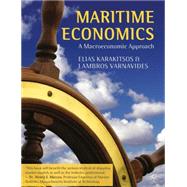The 21st century has seen shipping evolve from a fundamental transport industry into an asset which is at the mercy of speculative flows and business cycles. This structural shift has a number of important ramifications for the business of shipping as well as for investment strategy. This ground breaking text develops a new macroeconomic approach to maritime economics, with an emphasis on the individual shipping markets and their interdependence, in order to arm the reader with a more comprehensive understanding of the way modern shipping markets function and enable the making of critical decisions such as when to buy and sell ships and when to be in the spot or the period market.
Karakitsos and Varnavides bring together their wealth of experience in shipping, finance and academia to make a number of key contributions to the study of maritime economics including:
• Viewing Freight rates as asset prices determined as a bargaining game between charterers and owners who form expectations of future demand and supply to create a dynamic analysis of freight rates.
• Theorising ships as assets, where prices are determined by demand and supply.
• Explaining how the demand for vessels is derived as a dynamic problem of fleet capacity expansion.
• Integrating the supply and the expectations approaches to shipping cycles.
• Explaining how shipping cycles are caused by business cycles and expectations in demand by integrating maritime economics with macroeconomics.
Maritime Economics: A Macroeconomic Approach is divided into three distinct parts; Part I analyses the micro-foundations of maritime economics, by deriving the demand and supply functions in the freight (spot and period), shipyard, second-hand and scrap markets. Part II reviews the efficiency of shipping markets and the theory of business and shipping cycles. Part III analyses the financialisation of shipping markets, the constraints of ship finance, the interaction between business and shipping cycles, and offers a case study of how decisions should be taken.
This key text is indispensable reading for advanced undergraduate students studying maritime economics or shipping degrees as well as for professionals working in the shipping industry or in the financial sector.
Karakitsos and Varnavides bring together their wealth of experience in shipping, finance and academia to make a number of key contributions to the study of maritime economics including:
• Viewing Freight rates as asset prices determined as a bargaining game between charterers and owners who form expectations of future demand and supply to create a dynamic analysis of freight rates.
• Theorising ships as assets, where prices are determined by demand and supply.
• Explaining how the demand for vessels is derived as a dynamic problem of fleet capacity expansion.
• Integrating the supply and the expectations approaches to shipping cycles.
• Explaining how shipping cycles are caused by business cycles and expectations in demand by integrating maritime economics with macroeconomics.
Maritime Economics: A Macroeconomic Approach is divided into three distinct parts; Part I analyses the micro-foundations of maritime economics, by deriving the demand and supply functions in the freight (spot and period), shipyard, second-hand and scrap markets. Part II reviews the efficiency of shipping markets and the theory of business and shipping cycles. Part III analyses the financialisation of shipping markets, the constraints of ship finance, the interaction between business and shipping cycles, and offers a case study of how decisions should be taken.
This key text is indispensable reading for advanced undergraduate students studying maritime economics or shipping degrees as well as for professionals working in the shipping industry or in the financial sector.








